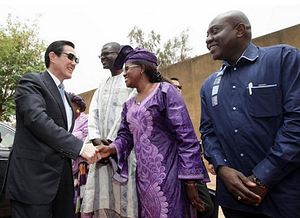The Gambia, formerly one of a handful of countries that recognized Taiwan, has officially resumed diplomatic relations with the People’s Republic of China. The Chinese and Gambian foreign ministers, Wang Yi and Neneh MacDouall-Gaye, signed a joint communique officially resuming diplomatic ties on March 17 in Beijing.
Part of the communique, as is standard procedure for Beijing, had Gambia officially recognize the “one China” policy: “that there is only one China in the world and that the government of the People’s Republic of China is the sole legal government representing the whole of China and that Taiwan is an inalienable part of China’s territory.” Wang, calling the ceremony an “historic moment” for China and Gambia, expressed his confidence that “the Gambian government will strictly adhere to the one-China policy and support China’s undertakings for peaceful unification.”
Adding insult to injury, the resumption of diplomatic ties between China and Gambia came while Taiwanese President Ma Ying-jeou is on an overseas tour, visiting Guatemala and Belize with transit stops through Houston and Los Angeles in the United States. While in Belize, Ma met with the premiers of three additional diplomatic allies, Saint Kitts and Nevis, Saint Vincent and the Grenadines, and Saint Lucia (all Caribbean states).
Even while Ma celebrated diplomatic relations with Taiwan’s Caribbean and Central American partners, his administration watched Gambia’s alignment with China. In response, the Ministry of Foreign Affairs issued a statement expressing “regret” over “The Gambia’s decision to establish official ties with mainland China.” The ministry pledged that Taiwan “will continue to strengthen relations with its diplomatic allies.”
Meanwhile, the Mainland Affairs Council expressed “strong dissatisfaction” over the decision, saying Beijing’s move to establish relations with Gambia could damage mutual trust and stability in cross-strait relations. Beijing should face the fact that “the Republic of China is a sovereign country” and “not take negative unilateral actions,” MAC said, warning that “China will have to take full responsibility for any consequences.”
In response to questions about the new China-Gambia relationship, Foreign Ministry spokesperson Lu Kang insisted that “the restoration of diplomatic ties between China and Gambia targets no one.”
The ceremony on Wednesday ended over two years of diplomatic limbo for Gambia. The tiny West African state severed diplomatic ties with Taiwan in November 2013, the latest move in a history of flip-flopping when it comes to the “one China” policy. The Gambia established diplomatic relations with the PRC in 1974, but then cut ties with Beijing in favor of Taipei in 1995. In 2013 it dropped its relationship with Taiwan, apparently in favor of the PRC. President Gambian President Yahya Jammeh wrote on his Facebook page in November 2013 that “the People’s Republic of China will be … the only China to be recognized diplomatically by The Gambia going forward.”
But Beijing didn’t bite, possibly out of respect for an informal “diplomatic truce” between China and Taiwan at the time. Prior to Wednesday, the last Taiwanese diplomatic ally to formally establish ties with Beijing was Malawi, in December 2007 – one month before Ma was elected. Malawi was only one of a number of countries to cut ties with Taiwan in favor of the PRC during the administration of President Chen Shui-bian, whom Beijing despised as a ‘pro-independence’ leader. Since Ma, who ran on a promise to repair cross-strait ties, assumed office in 2008, China has held off on poaching any more of Taiwan’s allies. Embarrassing Ma by snatching up diplomatic allies might have ended public support for Ma’s cross-strait rapprochement.
Now, however, Ma is about to step down. His successor, Tsai Ing-wen of the Democratic Progressive Party, won a landslide victory in the January elections. Beijing has bad memories of Chen Shui-bian, the last DPP president, and has repeatedly voiced its concerns over “Taiwan independence” gaining force under Tsai. China’s move to establish ties with Gambia two months after Tsai’s election may be a none-too-subtle warning: make nice, or the diplomatic truce is over.
Taiwan currently has 22 diplomatic allies: 12 in Latin America and the Caribbean, six in the Pacific Islands, three in Africa, and one in Europe (the Vatican). In 2013, a Chinese expert told Reuters that at least five of Taiwan’s allies had approached China with requests to switch diplomatic recognition – likely lured by the financial benefits China’s partners receive. However, Beijing turned each would-be partner down out of a desire to support Ma.
From now on, the PRC may be more amenable to those requests, particularly if it wants to up the pressure on Tsai.

































